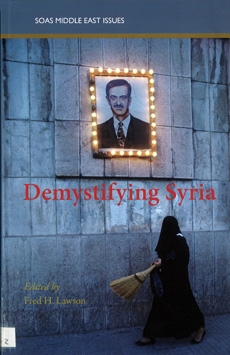| Éditeur : Saqi | Date & Lieu : 2009, London |
| Préface : | Pages : 224 |
| Traduction : | ISBN : 978-0-86556-654-7 |
| Langue : Anglais | Format : 155x235 mm |
| Code FIKP : Liv. Eng. Law. Dem. 3042 | Thème : Général |
|
Présentation
|
Table des Matières | Introduction | Identité | ||
 Demystifying Syria
| |||||
|
Introduction Fred H. Lawson Syria’s political, economic, social and diplomatic affairs are often described as ‘mysterious’, ‘puzzling’ or ‘strange’. Sometimes, the descriptions seem apt. At least for now, the October 2005 death of Minister of the Interior Ghazi Kan'an remains a mystery, as does the killing of General Muhammad Sulaiman at his beachfront chalet in early August 2008.1 Equally mysterious at this point is the rapid and unexpected eclipse of General ‘Asif Shawkat, the brother-in-law of the president and head of one of the country’s powerful security services.2 And it is fair to say that ‘mystery surrounded a powerful car bomb explosion that ripped through a residential neighbourhood on the outskirts of Damascus [at the end of September 2008], killing at least seventeen people and injuring fourteen in the deadliest terrorist attack in Syria in more than two decades’.3 The location of the blast, just outside the headquarters of one of the security services, and at a busy crossroads leading to the Shi'i pilgrimage site of the tomb of al-Sayyidah Zainab, leaves one wondering whether the intended target was the military post or the Lebanese, Iraqi and Iranian pilgrims who frequent the area. Other so-called mysteries reflect a lack of information or superficial analysis. It is probably not helpful to conclude, for instance, that an armed skirmish between Islamist militants and security personnel that erupted in the heart of the capital in June 2006 ‘remains shrouded in mystery’, despite a flood of rumours surrounding the episode.4 It is almost certainly misleading ... 1. ‘Syrian Interior Minister “Commits Suicide’”, The Times (London), 12 October 2005; Nicholas Blanford, ‘The Mystery Behind a Syrian Murder’, Time, 7 August 2008. 2. ‘The Mysterious Downfall of Assef Shawkat’, Mideast Monitor, vol. 3, August 2008. 3. ‘Car Bombing in Damascus Kills at least 17’, Los Angeles Times, 28 September 2008. 4. Chris Zambelis, ‘Violence in Syria Points to Growing Radical Islamist Unrest’, Terrorism Focus, vol. 3,13 June 2006. | ||||